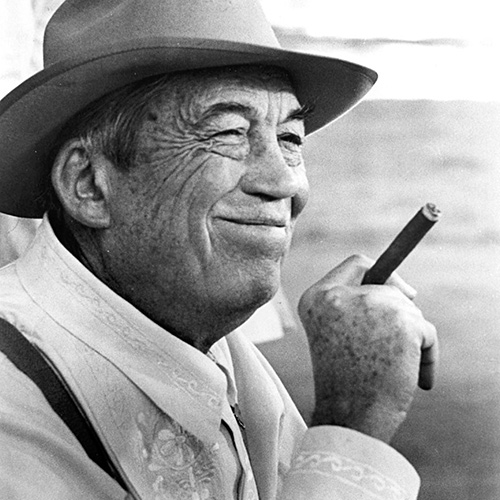
John Huston as Noah Cross in 1974’s Chinatown
The memorable films of John Huston (1906–1987) are difficult to categorize. There were noir-ish thrillers (The Maltese Falcon, The Treasure of the Sierra Madre, Key Largo, The Asphalt Jungle); rugged dramatic adventures (The African Queen; Moby Dick; Heaven Knows, Mr. Allison); stylistic and stylized biographies (Moulin Rouge, Freud); adaptations of challenging literary/theatrical works (The Red Badge of Courage, Night of the Iguana, Reflections in a Golden Eye, The Man Who Would Be King, Under the Volcano, among others)—even occasional comedies (Beat the Devil, Prizzi’s Honor).
For 46 years, Huston masterfully navigated the Hollywood system, offsetting conventional commercial assignments with deeply uncompromising personal projects. His films are stories of triumph and suffering, of anti-heroes and sociopaths, alcoholics, adventurers, and lusty rebels.
Huston was a larger-than-life figure whose Hemingwayesque legend sometimes threatens to overshadow his cinematic achievements. He certainly fit the image of the 20th century artistic maverick— from the booze-and-cigar consumption to the African hunting sprees. Huston could be tough and charming, coarse and sensitive. Only such a man could have endured Hollywood in all its savage incarnations from the 1930s (when he arrived as a screenwriter) until the late ‘80s. Only such a man could have directed Humphrey Bogart six times and Marilyn Monroe twice. Only such a man could have directed Bette Davis, Robert Mitchum, Richard Burton, John Wayne, Burt Lancaster, Clark Gable, Marlon Brando—and lived to tell about it. Finally, only John Huston as an in-demand character actor could have endured such unrelenting taskmasters as directors Otto Preminger (The Cardinal), Roman Polanski (Chinatown), and even his close friend Orson Welles (The Other Side of the Wind).
The Nevada-born son of film star Walter Huston (1883–1950) had a knack for teaming dissimilar personalities in the same film and placing major stars in image-distorting roles: Jennifer Jones as a revolutionary fighting the Cuban government; Brando as a repressed latent gay army major; Burton as a defrocked priest; Montgomery Clift as Sigmund Freud. As a director with acting experience, John Huston understood a star’s need to interpret difficult and challenging parts even if the public was not ready to accept the actor as such a character.
Join film historian Max Alvarez for this gritty online tribute, complete with plentiful film selections and archival images, to one of cinema’s greatest directing artisans.
General Information